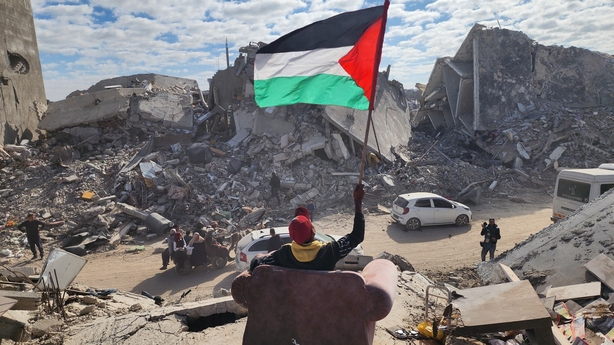The second batch of Israeli hostages will be released from Gaza on Saturday as planned, Hamas has said in a statement.
Hamas is set to release the more than 90 hostages over the coming weeks as part of a complex ceasefire deal reached with Israel this month that could end the 15-month war in Gaza.
The militant group said in a statement that the next group of hostages would next be released on Saturday in exchange for Palestinian prisoners and detainees who are held by Israel.
Earlier, a Hamas official had said they would be released on Sunday, a day later than expected under a complex ceasefire accord reached earlier this month.
Nahed Al-Fakhouri, head of the Hamas prisoners' media office, said in a statement the names of hostages it would release would be provided on Saturday.
We need your consent to load this rte-player contentWe use rte-player to manage extra content that can set cookies on your device and collect data about your activity. Please review their details and accept them to load the content.Manage Preferences
Israel would similarly disclose the names of Palestinian prisoners to be released under the deal, he said.
"Based on these two lists, the actual implementation will be carried out on Sunday," Mr Al-Fakhouri added.
However, Hamas clarified that the next group of hostages would indeed be released on Saturday as planned.
It is expected that four hostages will be released, coinciding with the release of the Palestinian prisoners.
The three hostages released yesterday, all women, were reunited with their families and taken to hospital in central Israel where a doctor said they were in stable condition.
Hours later in the West Bank, Palestinian prisoners released by Israel in exchange left Ofer prison on buses at around 1am (11pm Irish time yesterday), with jubilant crowds celebrating their arrival in the nearby town of Beitunia.
As the ceasefire took effect yesterday morning, thousands of displaced, war-weary Palestinians set off across devastated Gaza to return home.
Palestinian militant group Hamas said that Gaza and its people "will rise again" and rebuild the territory battered by more than 15 months of bombardment.
"Gaza, with its great people and its resilience, will rise again to rebuild what the occupation has destroyed and continue on the path of steadfastness until the occupation is defeated," Hamas said in a statement issued on the second day of a ceasefire with Israel.
"Over the course of 471 days, the systematic crimes of the occupation have failed to dissuade our people and their valiant resistance from clinging to the land and confronting the aggression."
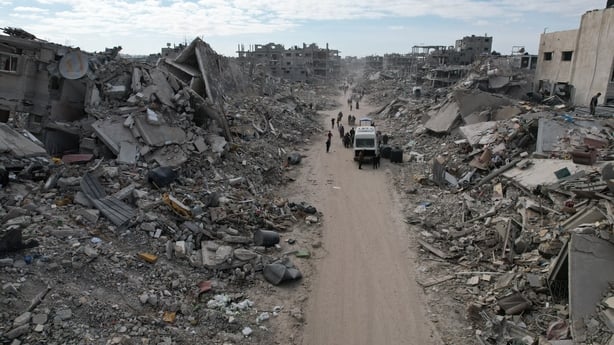
The truce began on the eve of the Donald Trump's inauguration for a second term as US president, who has claimed credit for the agreement after months of fruitless negotiations.
Mr Trump said on US television network NBC that he had told Israeli Prime Minister Benjamin Netanyahu the war "has to end".
If all goes according to plan, the implementation of the truce will take weeks if not months, with only the first phase of the truce agreed so far by all the parties.
Despite the risks, hundreds of Palestinians were streaming through an apocalyptic landscape in Jabalia in northern Gaza, one of the worst-hit areas in the war.
"We are finally in our home. There is no home left, just rubble, but it's our home," said Rana Mohsen, 43.
We need your consent to load this rte-player contentWe use rte-player to manage extra content that can set cookies on your device and collect data about your activity. Please review their details and accept them to load the content.Manage Preferences
The initial 42-day truce was brokered by Qatari, US and Egyptian mediators.
It should enable a surge of sorely needed humanitarian aid into Gaza, as more Israeli hostages are released in exchange for Palestinians in Israeli custody.
Under the agreement, Israeli forces should leave some areas of Gaza as the parties begin negotiating the terms of a permanent ceasefire.
During the initial truce, Israeli hostages, 31 of whom were taken by militants during Hamas's 7 October, 2023 attack, are due to be returned from Gaza in exchange for around 1,900 Palestinians.
Reunited
The first three released hostages, Emily Damari, Romi Gonen and Doron Steinbrecher, returned home to Israel after Hamas fighters handed them over to the Red Cross in a bustling square in Gaza City, surrounded by gunmen in fatigues and balaclavas.
"In Emily's own words, she is the happiest girl in the world; she has her life back," Damari's mother Mandy said, adding that she was "doing much better than any of us could have expected", even after she had lost two fingers.
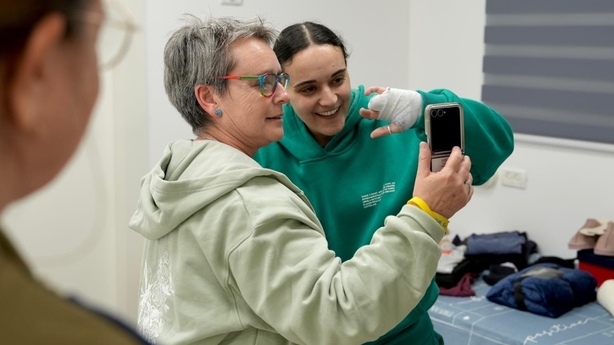
Damari, a British-Israeli dual national, was at home in Kfar Aza in southern Israel when Hamas gunmen stormed her home on 7 October, 2023, injuring her hands and legs and taking her hostage.
Ms Steinbrecher's family said in a statement that "our heroic Dodo, who survived 471 days in Hamas captivity, begins her rehabilitation journey today".
In Tel Aviv, there was elation among the crowd who had waited for hours for the news of their release, with the Hostages and Missing Families Forum campaign group hailing their return as "a beacon of light".
Anxiety in Israel followed over the next phases of the truce, with columnist Sima Kadmon warning in the Yedioth Ahronoth daily that the coming hostage releases may be more painful.
"Some of them will arrive on gurneys and wheelchairs. Others will arrive in coffins. Some will arrive wounded and injured, in dire emotional condition that will prevent some of the footage from being broadcast," she wrote.
Journalist Avi Issacharoff, one of the creators of hit series Fauda, lashed out against the Israeli government for what he said was its failure "to engage in any way on the 'day after' the war".
Following the return of the three women hostages, the Israel Prison Service confirmed the release of 90 Palestinian prisoners.
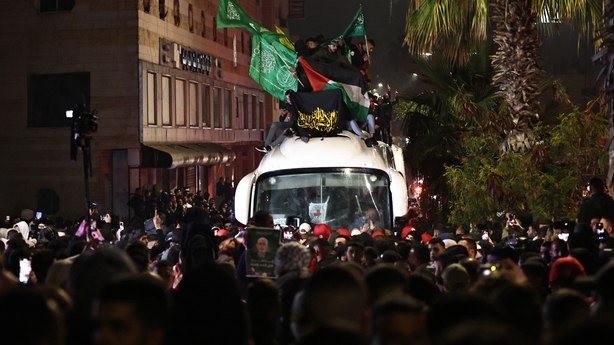
In the town of Beitunia, near Ofer prison, Palestinians cheered and chanted as buses carrying them arrived, with some climbing atop and unfurling a Hamas flag.
"All the prisoners being released today feel like family to us. They are part of us, even if they're not blood relatives," Amanda Abu Sharkh, 23, told AFP.
One freed detainee, Abdul Aziz Muhammad Atawneh, described prison as "hell, hell, hell".
The next hostage-prisoner swap should take place on Saturday, a senior Hamas official told AFP.
International Committee of the Red Cross president Mirjana Spoljaric called on all sides to "adhere to their commitments to ensure the next operations can take place safely".
'Nothing left'
Residents and medics in Gaza reported isolated incidents since the ceasefire began.
Medics said eight people had been hit by Israeli fire since this morning in the southern city of Rafah, without giving details of their condition.
The Israeli military said it was checking the reports.
Palestinian Emergency Services said that a search is under way for thousands of Palestinians believed to be buried under rubble, as Gaza's residents expressed shock at the devastation on the second day of a ceasefire between Israel and Hamas.
"We are searching for 10,000 martyrs whose bodies remain under the rubble," said Mahmoud Basal, spokesperson of the Palestinian Civil Emergency Services.
Displaced Gazan Mohamed Gomaa lost his brother and nephew in the war.
"It was a big shock, and the amount (of people) feeling shocked is countless because of what happened to their homes -it's destruction, total destruction. It's not like an earthquake or a flood, no no, what happened is a war of extermination," he said.
UN relief chief Tom Fletcher said 630 trucks carrying desperately needed aid had entered into Gaza in the hours after the start of the truce, with 300 of them headed to the north of the territory.
The truce is intended to pave the way for a permanent end to the war, but a second phase has yet to be finalised.
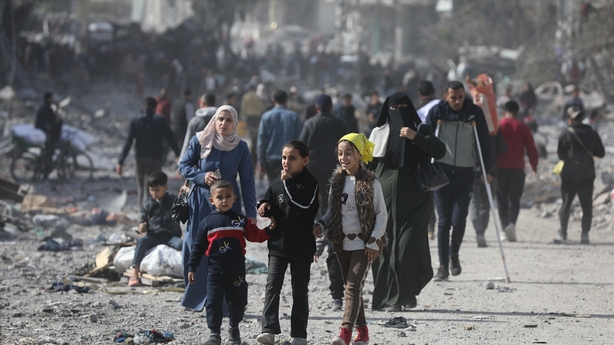
Thousands of Palestinians carrying tents, clothes and their personal belongings were seen going home yesterday, after the war displaced the vast majority of Gaza's population of 2.4 million.
Returning Jabalia resident Walid Abu Jiab said he found "massive, unprecedented destruction", with "nothing left" in Gaza's war-battered north, which has seen intense violence over the past months.
In Deir el-Balah, in central Gaza, displaced woman Umm Hasan al-Buzom, 70, said she would even "crawl my way back home" if needed.
"But we can't return for fear that the (Israeli) occupation forces might shoot at us."
The World Food Programme said it was moving full throttle to get food to as many Gazans as possible.
"We're trying to reach a million people within the shortest possible time," said its deputy executive director, Carl Skau.
The war's only previous truce, for one week in November 2023, also saw the release of hostages held by militants in exchange for Palestinian prisoners.
Read more: Ceasefire leaves shattered Gaza and divided Israel in its wake
Gazan children expected to arrive 'shortly' for treatment
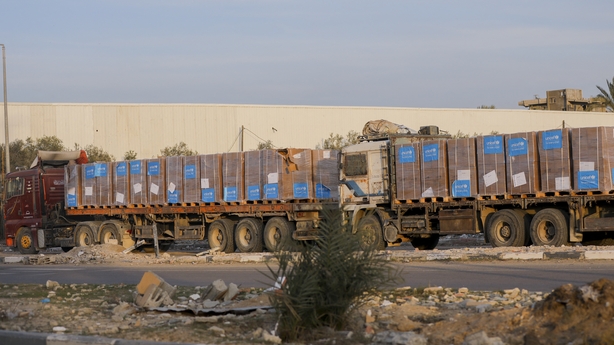
Aid workers say northern Gaza was particularly hard hit, and lacked all essentials including food, shelter and water.
The World Health Organization said it was ready to pour aid into Gaza but that it would need "systematic access" across the territory to do so.
The agency's chief, Tedros Adhanom Ghebreyesus, later said on X that "restoring the health system in Gaza will be a complex and challenging task, given the scale of destruction".
The ceasefire in #Gaza and the start of the hostage and prisoner release process bring great hope for millions of people whose lives have been ravaged by the conflict.
— Tedros Adhanom Ghebreyesus (@DrTedros) January 19, 2025
It is a moment I have been calling and hoping for.
However, addressing the massive health needs and… pic.twitter.com/Lyfuyab9Sw
On the eve of the truce, Mr Netanyahu called the first phase a "temporary ceasefire" and said Israel had US support to return to the war if necessary.
Hamas's armed wing, the Ezzedine al-Qassam Brigades, said its adherence to the truce would be "contingent on the enemy's commitment".
